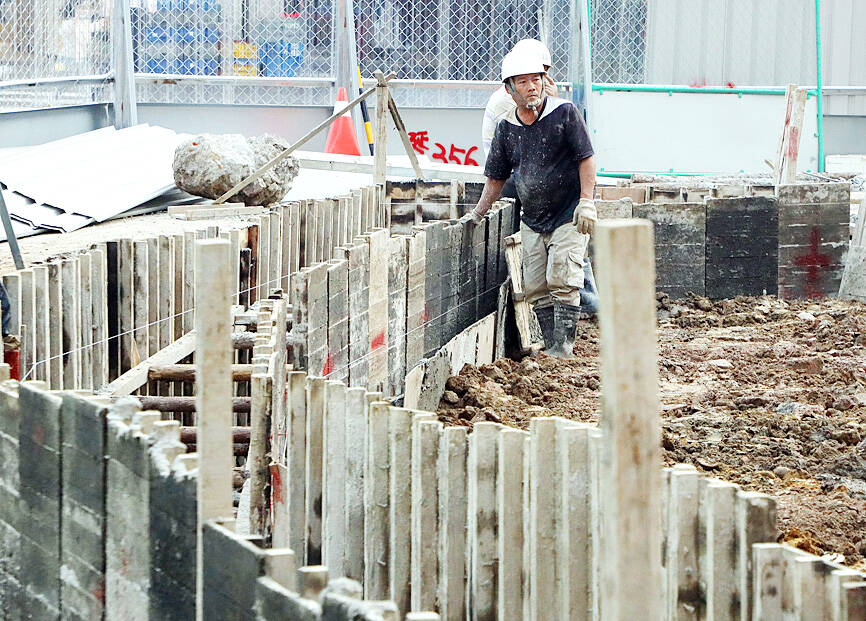Average monthly take-home pay in February increased 2.52 percent from a year earlier to NT$45,917, while total wages — which includes overtime pay, performance-based commissions and bonuses — soared 54.84 percent to NT$81,576 on the back of Lunar New Year bonuses, the Directorate-General of Budget, Accounting and Statistics (DGBAS) said yesterday.
Taiwanese firms on average issued Lunar New Year bonuses equivalent to 1.69 months of regular wages, or NT$77,348, the highest in nine years and up from 1.68 months a year earlier, Census Department Deputy Director Chen Hui-hsin (陳惠欣) said.
“The improvement came after service providers benefited from sustained revenge consumption in the post-COVID-19 pandemic era, although manufacturers took a hit from a global slowdown,” Chen told a news conference.

Photo: CNA
Financial and insurance companies offered the highest bonuses, averaging 3.64 months of wages, or NT$251,402, she said.
Manufacturers distributed 2.11 months of year-end bonuses, lower than the 2.14 months last year, she said, adding that suppliers of electronic components gave 2.76 months of bonuses, also weaker than 2.8 months a year earlier.
Exporters of tech and non-tech products had idle capacities and headcounts last year as they grappled with business declines induced by inventory adjustments and global inflation, Chen said.
Recreational facilities, hotels and restaurants fared better, issuing bonuses of 0.44 months to 0.74 months, compared with smaller bonuses or none last year, she said.
In the first two months of this year, regular take-home pay rose 2.39 percent annually to NT$46,017, while overall wages expanded 3.74 percent to NT$81,982, she said.
Real take-home wages after inflation remained in positive territory for the first time in two years with a 1.29 percent uptick as inflation pressure eased, Chen said.
The timing of the holiday also played a role, as local companies sometimes distribute year-end bonuses in December when the Lunar New Year is in January, she said.
Regular monthly wages have a fair chance of beating inflation due to the wage hikes and consumer price data, Chen said.
Holiday disruptions also explained why the number of workers hired in the industrial and service sectors in February shrank 0.25 percent, or about 21,000 people, compared with January, the DGBAS said.
Most firms halted operations for the holiday, it said.
As a result, the accession rate in February shed 0.07 percentage points to 2.04 percent, while the dropout rate gained 0.24 percentage points to 2.29 percent, it said.

In a small town in Paraguay, a showdown is brewing between traditional producers of yerba mate, a bitter herbal tea popular across South America, and miners of a shinier treasure: gold. A rush for the precious metal is pitting mate growers and indigenous groups against the expanding operations of small-scale miners who, until recently, were their neighbors, not nemeses. “They [the miners] have destroyed everything... The canals, springs, swamps,” said Vidal Britez, president of the Yerba Mate Producers’ Association of the town of Paso Yobai, about 210km east of capital Asuncion. “You can see the pollution from the dead fish.

MULTIFACETED: A task force has analyzed possible scenarios and created responses to assist domestic industries in dealing with US tariffs, the economics minister said The Executive Yuan is tomorrow to announce countermeasures to US President Donald Trump’s planned reciprocal tariffs, although the details of the plan would not be made public until Monday next week, Minister of Economic Affairs J.W. Kuo (郭智輝) said yesterday. The Cabinet established an economic and trade task force in November last year to deal with US trade and tariff related issues, Kuo told reporters outside the legislature in Taipei. The task force has been analyzing and evaluating all kinds of scenarios to identify suitable responses and determine how best to assist domestic industries in managing the effects of Trump’s tariffs, he

TIGHT-LIPPED: UMC said it had no merger plans at the moment, after Nikkei Asia reported that the firm and GlobalFoundries were considering restarting merger talks United Microelectronics Corp (UMC, 聯電), the world’s No. 4 contract chipmaker, yesterday launched a new US$5 billion 12-inch chip factory in Singapore as part of its latest effort to diversify its manufacturing footprint amid growing geopolitical risks. The new factory, adjacent to UMC’s existing Singapore fab in the Pasir Res Wafer Fab Park, is scheduled to enter volume production next year, utilizing mature 22-nanometer and 28-nanometer process technologies, UMC said in a statement. The company plans to invest US$5 billion during the first phase of the new fab, which would have an installed capacity of 30,000 12-inch wafers per month, it said. The

ASML Holding NV, the sole producer of the most advanced machines used in semiconductor manufacturing, said geopolitical tensions are harming innovation a day after US President Donald Trump levied massive tariffs that promise to disrupt trade flows across the entire world. “Our industry has been built basically on the ability of people to work together, to innovate together,” ASML chief executive officer Christophe Fouquet said in a recorded message at a Thursday industry event in the Netherlands. Export controls and increasing geopolitical tensions challenge that collaboration, he said, without specifically addressing the new US tariffs. Tech executives in the EU, which is